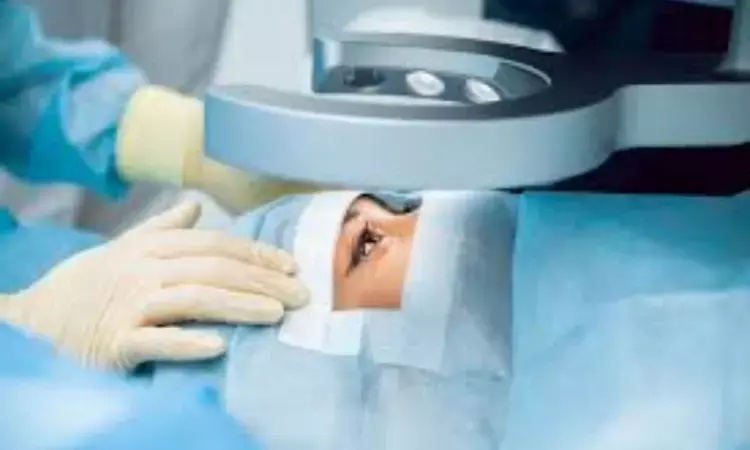- Home
- Medical news & Guidelines
- Anesthesiology
- Cardiology and CTVS
- Critical Care
- Dentistry
- Dermatology
- Diabetes and Endocrinology
- ENT
- Gastroenterology
- Medicine
- Nephrology
- Neurology
- Obstretics-Gynaecology
- Oncology
- Ophthalmology
- Orthopaedics
- Pediatrics-Neonatology
- Psychiatry
- Pulmonology
- Radiology
- Surgery
- Urology
- Laboratory Medicine
- Diet
- Nursing
- Paramedical
- Physiotherapy
- Health news
- Fact Check
- Bone Health Fact Check
- Brain Health Fact Check
- Cancer Related Fact Check
- Child Care Fact Check
- Dental and oral health fact check
- Diabetes and metabolic health fact check
- Diet and Nutrition Fact Check
- Eye and ENT Care Fact Check
- Fitness fact check
- Gut health fact check
- Heart health fact check
- Kidney health fact check
- Medical education fact check
- Men's health fact check
- Respiratory fact check
- Skin and hair care fact check
- Vaccine and Immunization fact check
- Women's health fact check
- AYUSH
- State News
- Andaman and Nicobar Islands
- Andhra Pradesh
- Arunachal Pradesh
- Assam
- Bihar
- Chandigarh
- Chattisgarh
- Dadra and Nagar Haveli
- Daman and Diu
- Delhi
- Goa
- Gujarat
- Haryana
- Himachal Pradesh
- Jammu & Kashmir
- Jharkhand
- Karnataka
- Kerala
- Ladakh
- Lakshadweep
- Madhya Pradesh
- Maharashtra
- Manipur
- Meghalaya
- Mizoram
- Nagaland
- Odisha
- Puducherry
- Punjab
- Rajasthan
- Sikkim
- Tamil Nadu
- Telangana
- Tripura
- Uttar Pradesh
- Uttrakhand
- West Bengal
- Medical Education
- Industry
Cataract surgery linked with lessened dementia risk: Study

Cataract Surgery
Cataracts affect most older adults at risk for dementia, and now researchers are finding strong evidence that cataract surgery is associated with a lower risk of developing dementia.
The Adult Changes in Thought (ACT) study is a long-standing, Seattle-based observational study at Kaiser Permanente Washington of more than 5,000 participants older than 65. Based on the longitudinal data of over 3,000 ACT study participants, researchers have now found that subjects who underwent cataract surgery had nearly 30% lower risk of developing dementia from any cause compared with those who did not. This lowered risk persisted for at least a decade after surgery. Cataract surgery was also associated with lower risk of Alzheimer disease dementia specifically. The results were reported Dec. 6 in JAMA Internal Medicine.
Lead researcher Dr. Cecilia S Lee, associate professor and Klorfine Family Endowed Chair in ophthalmology at the University of Washington School of Medicine, said the observational study adjusted for a number of potential confounders, yet still yielded a strong association.
"This kind of evidence is as good as it gets in epidemiology," Lee said. "This is really exciting because no other medical intervention has shown such a strong association with lessening dementia risk in older individuals."
The mechanisms by which cataract surgery and lessened dementia risk are associated was not determined in this study. Researchers hypothesize that people may be getting higher quality sensory input after cataract surgery, which might have a beneficial effect in reducing the risk of dementia.
"These results are consistent with the notion that sensory input to the brain is important to brain health," said co-author Dr. Eric B. Larson, a principal investigator of the ACT study, and senior investigator at Kaiser Permanente Washington Health Research Institute.
Lee said another hypothesis is that after cataract surgery, people are getting more blue light.
"Some special cells in the retina are associated with cognition and regulate sleep cycles, and these cells respond well to blue light," she said, "Cataracts specifically block blue light, and cataract surgery could reactivate those cells."
The study results highlight a strong case for further research on the eye-brain connection in dementia. Previous studies by Lee's group at the UW have shown a strong link between other retinal diseases, such as age-related macular degeneration, and the development of Alzheimer disease and dementia. Subjects with macular degeneration or other retinal degenerative diseases are more likely to develop dementia, In the current study, subjects undergoing vision-improving cataract surgery had lower risk of developing dementia. Further understanding the connection between the aging eye and brain may offer insights and potential therapies to slow or prevent age-related dementia.
Hina Zahid Joined Medical Dialogue in 2017 with a passion to work as a Reporter. She coordinates with various national and international journals and association and covers all the stories related to Medical guidelines, Medical Journals, rare medical surgeries as well as all the updates in the medical field. Email: editorial@medicaldialogues.in. Contact no. 011-43720751
Dr Kamal Kant Kohli-MBBS, DTCD- a chest specialist with more than 30 years of practice and a flair for writing clinical articles, Dr Kamal Kant Kohli joined Medical Dialogues as a Chief Editor of Medical News. Besides writing articles, as an editor, he proofreads and verifies all the medical content published on Medical Dialogues including those coming from journals, studies,medical conferences,guidelines etc. Email: drkohli@medicaldialogues.in. Contact no. 011-43720751


